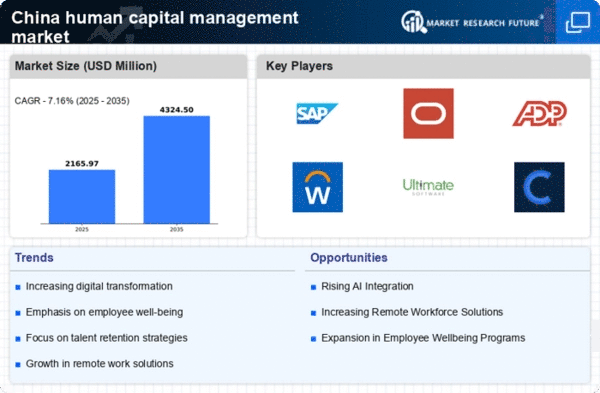Shift Towards Remote Work Solutions
The shift towards remote work solutions has emerged as a critical driver in the human capital-management market in China. As organizations adapt to new work models, there is a growing need for tools that facilitate remote collaboration and performance management. The market for human capital-management software that supports remote work is anticipated to grow by 15% annually, reflecting the increasing reliance on digital platforms for workforce management. Companies are investing in cloud-based solutions that enable seamless communication, project management, and employee monitoring. This transition not only enhances productivity but also allows organizations to tap into a broader talent pool, unrestricted by geographical limitations. Consequently, the demand for human capital-management solutions that cater to remote work dynamics is likely to expand, reshaping the market landscape.
Regulatory Compliance and Labor Laws
The human capital-management market in China is significantly influenced by the evolving landscape of regulatory compliance and labor laws. The Chinese government has implemented various labor regulations aimed at protecting employee rights and ensuring fair treatment in the workplace. This has led organizations to invest in human capital-management solutions that facilitate compliance with these regulations. For instance, the market for human capital-management software is projected to grow at a CAGR of 12% from 2025 to 2030, driven by the need for businesses to adhere to labor laws. Companies are increasingly adopting automated systems to manage employee records, payroll, and benefits, thereby reducing the risk of non-compliance and potential penalties. As a result, the demand for sophisticated human capital-management solutions is likely to rise, reflecting the importance of regulatory adherence in the market.
Talent Acquisition and Retention Strategies
In the competitive landscape of the human capital-management market, talent acquisition and retention strategies are paramount for organizations in China. With a rapidly changing job market, companies are focusing on innovative recruitment methods to attract top talent. The human capital-management market is expected to witness a surge in demand for applicant tracking systems and recruitment software, projected to reach a value of $2 billion by 2026. Furthermore, organizations are increasingly recognizing the importance of employee engagement and satisfaction in retaining talent. This has led to the implementation of comprehensive onboarding programs and continuous learning opportunities, which are essential for fostering a positive workplace culture. As businesses strive to build a skilled workforce, the emphasis on effective talent management strategies is likely to drive growth in the human capital-management market.
Focus on Diversity and Inclusion Initiatives
Diversity and inclusion initiatives are becoming increasingly vital in the human capital-management market in China. Organizations are recognizing the value of a diverse workforce in driving innovation and improving business performance. As a result, there is a growing emphasis on implementing policies that promote inclusivity and equal opportunities for all employees. The human capital-management market is projected to see a rise in demand for tools that support diversity hiring practices and track diversity metrics, with an expected market value of $1.5 billion by 2027. Companies are also investing in training programs aimed at fostering an inclusive workplace culture. This focus on diversity not only enhances employee morale but also aligns with the broader societal push for equality, thereby influencing the strategic direction of the human capital-management market.
Integration of Artificial Intelligence in HR Processes
The integration of artificial intelligence (AI) in HR processes is transforming the human capital-management market in China. Organizations are increasingly leveraging AI technologies to streamline various HR functions, such as recruitment, performance evaluation, and employee engagement. The market for AI-driven human capital-management solutions is projected to grow at a CAGR of 18% over the next five years, indicating a strong trend towards automation and data-driven decision-making. AI tools enable HR professionals to analyze large volumes of data, identify patterns, and make informed decisions regarding talent management. This not only enhances operational efficiency but also improves the overall employee experience. As businesses seek to optimize their HR processes, the adoption of AI in the human capital-management market is likely to accelerate, reflecting a broader trend towards technological innovation.
















